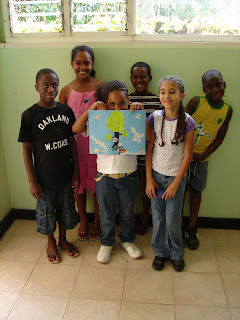Tuesday, June 1st, 2010
Greetings,
After Hellshire the group was split in two for hub-based training, with the Youth sector heading to Stony Hill and the Health and Environment sectors going to the mountain town of Ewarton. We spent four weeks in Ewarton where our training took on a more sector specific focus. We still continued the language, cultural, safety and health sessions but added in sessions looking at local and national environmental issues as well as methods for improving agriculture.
My new host family and accommodations were very nice. My host mother, Miss Pauline, is a teacher at a primary school and my host father, Danny, is a farmer. They have a daughter who is a few years younger than myself but she lives and works in Kingston. The different cooking style of my new host family is a welcomed change, they eat a lot more fresh vegetables and a lot less starches and fried foods than my last host family. I had not had a salad in weeks before coming to Ewarton where I was having one every day. Also, there were no water shortage issues in Ewarton which means no more bucket showers!
I now have a much better understanding of Patois, enough to understand most of what is being said and I am able to give basic responses. For our environmental training we learned a lot about shade /green houses, bauxite plants and their impacts, invasive flora and fauna, over fishing and coastal degradation to name a few of the subjects. We also learned about various forms of environmental alternative incomes such as trash to cash (also called up-cycling) where items that are traditionally tossed are turned into an income generating product, such as homemade paper or planters made from old tires.
After Ewarton we went back to Kingston for our final week of training and pre-service interviews. My interviews went well and I received very positive feedback on my participation and performance during training. At the end of the week we all learned of our posts for the next two years. Although I had a good idea of where I was going to be placed, it was confirmed that I will be working at the Discovery Bay Marine Lab. I am very excited about this placement and my supervisor plans on having me involved in all the work and research occurring at the lab. On Friday, May 21st Peace Corps Jamaica Group 81 trainees were sworn in as volunteers at the US Embassy and that afternoon everyone went to their respective sites to officially begin their service.
Several people have contacted me with concerns about the current situation in Kingston and how it may be affecting myself and the other PCV's (Peace Corps Volunteers). The issue involves an extradition request by the US Government for Christopher “Dudus” Coke on charges of gunrunning and drug dealing. Dudus is a don of a district in Kingston, Tivoli Gardens, which happens to be strongly aligned with the current ruling party, the JLP (Jamaican Labor Party). The JLP signed the request on May 17th after months of delaying. As a result residents of that district barricaded the roads and that weekend security forces engaged them. That same weekend a police station was fire-bombed and the major produce market in Kingston was burned down. PCV Group 81 was in Kingston during that week, for swearing in, but we left on Friday for our sites which was a day or two before the violence started. PCV's and PC Staff that were still in the Kingston area were required to stay in their homes and a few of the PCV's chose to be evacuated to other parts of the island. All PCV's were put under increased security restrictions which were just lifted today. Our Safety and Security Coordinator visited various parts of Kingston today, including Tivoli Gardens, and concluded that the situation has calmed down. I have not felt any of the effects of these incidents and feel very safe at my site.
On that note, how has everyone been? I hope this letter finds everyone well.
TTFN
~Greg
 The camp itself made for a very intense month. To give my former coworkers an idea of how busy, it was like Marine Quest x 10. Most days we arrived early to prepare for the day, spent the day coordinating activities, giving powerpoint lectures, teaching and guiding experiments, assisting with snorkeling and at the end of the day we started our preparations for the next. The first, and youngest, group was probably the best. They were the most well behaved and engaging of all the groups.
The camp itself made for a very intense month. To give my former coworkers an idea of how busy, it was like Marine Quest x 10. Most days we arrived early to prepare for the day, spent the day coordinating activities, giving powerpoint lectures, teaching and guiding experiments, assisting with snorkeling and at the end of the day we started our preparations for the next. The first, and youngest, group was probably the best. They were the most well behaved and engaging of all the groups. 


